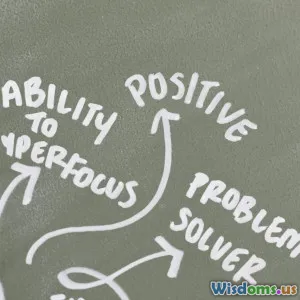
The Power of Positive Thinking
7 min read Explore how positive thinking reshapes your mind, behavior, and life outcomes using psychology-based insights and real-world examples. (0 Reviews)
The Power of Positive Thinking: Unlocking Your Mind’s Potential
Positive thinking is more than just a feel-good phrase popularized by self-help trends—it's a powerful psychological tool that influences every facet of your life. From enhancing mental health to improving relationships and even increasing resilience against stress, the attitude you adopt can genuinely shape your reality. This article will delve deep into the science behind positive thinking, its benefits, practical applications, and how you can truly harness its power to transform your life.
What Is Positive Thinking?
Positive thinking involves focusing on the good and constructive elements in any given situation. It is the mental attitude of expecting favorable outcomes and interpreting challenges as opportunities for growth rather than threats. Rooted in cognitive psychology, positive thinking emphasizes reframing negative thoughts and beliefs to foster a more optimistic perspective.
Dr. Martin Seligman, a prominent psychologist known for his work in positive psychology, describes positive thinking not as ignoring life's difficulties but as cultivating a hopeful and resilient mindset that can cope better with adversity.
The Psychology Behind Positive Thinking
Research shows that our thoughts can dramatically influence our emotions, behaviors, and health. When we cultivate positive thinking, the brain undergoes notable changes:
- Neuroplasticity: Our brains continuously change based on thoughts and experiences. Persistent positive thinking helps form neural pathways associated with optimism, enhancing emotional regulation.
- Stress Reduction: Positive thinkers demonstrate lower cortisol levels and better immune responses. For example, a 2013 study published in the Journal of Personality and Social Psychology found optimists are more likely to have healthier heart function and longer lifespans.
- Cognitive Biases: While humans naturally lean toward negativity (a survival mechanism), conscious practice of positivity fights this bias, resulting in better decision-making and problem-solving.
Real-World Evidence: How Positive Thinking Changes Lives
Health Benefits
Countless studies have linked positivity to physical health. A landmark 2006 Harvard study revealed that patients with positive expectations during recovery from coronary artery bypass surgery experienced quicker healing and fewer complications.
Furthermore, positive thinking contributes to pain management and reduced risk of chronic illnesses. The Mayo Clinic highlights that optimistic individuals display healthier lifestyle choices, like balanced diets and regular exercise, reinforcing long-term well-being.
Success in Career and Personal Ambitions
Positive thinking fosters perseverance and motivation—key traits in successful people. Thomas Edison epitomized this mindset, famously stating, "I have not failed. I've just found 10,000 ways that won't work," exemplifying optimism amid repeated setbacks.
Studies involving job applicants and entrepreneurs show that those with optimistic outlooks are more proactive and better at networking and innovation. They interpret failures as temporary hurdles, increasing their likelihood of eventual success.
Social and Relationship Impact
Optimistic people tend to develop stronger social connections. Research published in Personality and Social Psychology Review found that positivity increases empathy, cooperation, and constructive communication, all vital for fulfilling relationships. Furthermore, positive emotional contagion spreads optimism, creating supportive and harmonious environments.
Practical Strategies to Cultivate Positive Thinking
If you're wondering how to embed positivity into your daily life, here are evidence-based techniques:
1. Practice Cognitive Reframing
Whenever negative thoughts occur, consciously challenge and transform them. For example, instead of thinking, "I'll never get this right," reframe it as, "This is a learning opportunity and I will improve."
2. Gratitude Journaling
Keeping a daily journal where you note things you're grateful for can rewire your brain to focus on positives. Research from UCLA shows that gratitude practice boosts dopamine production, heightening happiness.
3. Visualization and Affirmations
Visualize successful outcomes vividly and repeat positive affirmations that reinforce your goals and self-belief. Athletes often use this method to enhance performance and reduce anxiety.
4. Surround Yourself with Positivity
Limit exposure to pessimistic influences—be it media or toxic relationships—and engage with people who inspire and uplift you.
5. Mindfulness and Meditation
These practices enhance awareness of your thought patterns, enabling you to catch negativity early and respond with a more balanced outlook.
Addressing Common Misconceptions
While positive thinking offers many benefits, it’s vital to recognize that it is not about ignoring real problems or emotions. Toxic positivity, the insistence on happiness at all times, can be damaging by suppressing authentic experiences.
The goal is to develop realistic optimism—a mindset that embraces challenges honestly but chooses hope and solution-focused thinking to navigate difficulties.
Conclusion: Embrace the Positive for Lasting Change
Positive thinking wields remarkable power—not as a magical cure, but as a scientifically supported approach to well-being and success. By changing how we interpret and react to life’s events, we empower ourselves to reduce stress, improve health, nurture relationships, and achieve goals.
Incorporate the outlined strategies gradually, and over time, you will notice not just changes in your mindset but tangible improvements in your everyday experiences. As the saying goes, "Whether you think you can or you think you can’t, you’re right." Choose optimism, and unlock the door to endless possibilities.
“Optimism is the faith that leads to achievement. Nothing can be done without hope and confidence.” – Helen Keller
Rate the Post
User Reviews
Popular Posts





















